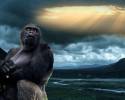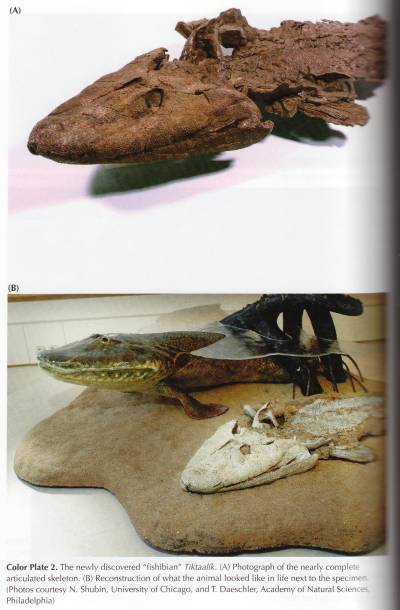This entry is part of a series. For a bit of an introduction and an index of all entries in the series, go here.
 Today's entry will cover Chapter 2, The Trinil Ape-man.
Today's entry will cover Chapter 2, The Trinil Ape-man.
McCann seems to be one of the people that would ask, "If evolution is true, why are there still monkeys?" He doesn't seem to understand phylogeny.
Out of all this "proof," dignified as the palæontological evidence of man's descent, Professor Osborn draws so many shreds of secret doubt that he must protect himself against the difficulties in his path by admitting ("Guide Leaflet," series No. 52, p. 4) "Man is not descended from any known form of ape, either living or fossil." This confession is not original with Osborn nor is it new with any of the monkey evolutionists. You will find it back in 1871 on Darwin's lips: "But we must not fall into the error of supposing that the early progenitors of man were identical with or even closely resembled any existing ape or monkey." (See 'Descent of Man,' 1871, vol. I, p. 158.) (McCann, 22)
Neither Darwin nor Osborn were making any type of 'confession'. They were explaining a point about the history of life that's too often misunderstood. The easiest way to see the error in McCann's line of thinking is through analogy. I'll use myself as an example. My great great grandfather and grandmother on one side were German - not just of German acenstry, but born in Germany and immigrants to the U.S. So, I can quite literally say that I am descended from Germans. But it's also quite obvious that I'm not descended from any living Germans. A certain group of Germans and I share a common ancestry through my great great great grandparents. The descendants of my great great great grandparents split into two lineages - one that continued in the U.S., and one that continued in Germany. That lineage in Germany is composed of my cousins, not my ancestors. It is a very similar case with us and chimpanzees and bonobos. Around 6 million years ago, there was a population of apes that was neither human, chimpanzee, nor bonobo. Over the generations, this population split into multiple lineages, each of which evolved independently. Most of those lineages have gone extinct, but there are still three of us left. We are cousins. We can go back further in time and find the ancestor that we share with gorillas, and further to find the ancestor we share with orangutans, and on and on all the way back till life began. (Obviously, we haven't actually found fossils of all species that have ever existed. But, in the same way that you know you must have a great great great great great great grandmother, even if you don't have any record of her, we also know that we must have common ancestors with Earth's other organisms, even if we haven't yet found their fossils.)
Where the quote from Darwin is a bit misleading is that word 'closely'. We should expect the common acestor of us, chimps, and bonobos to resemble the three of us. We share many features with our cousins, and the most likely reason is because those features were present in our common ancestor (See here for a look at just how similar we are to bonobos).
To be honest, the main reason I included the following quote is because I thought "ape-manologist" was pretty funny.
Hence Virchow's word of caution to the all-too-eager ape-manologists, urging them in their elaboration of missing links to wait until they can get hold of a real skeleton, a complete skeleton, to take the place of their few fragments of broken bones. (McCann, 25)
This is one of the areas where I do have a bit of smypathy for McCann. In his time, we just hadn't discovered as many fossils as we have now. In the present, though, we certainly do have hominid fossils. Two classic examples are Lucy and Ardi, but they certainly aren't the only hominid fossils we have. (See here for an interesting discussion on how modern day creationists try to deal with those fossils.)
Just a little later on the same page, McCann showed that he didn't realize common descent applied to all life on this planet.
He [Osborn] might have said, speaking of resemblances, "In the hand of man the same bones are to be seen as in the tortoise. The elements in the foot of a lizard are the same even in the highly modified human foot." He would have found the words quoted on page 371, "Human Embryology and Morphology" by Arthur Keith, M.D., F.R.C.S., 1910, Royal College of Surgeons, University of Aberdeen, University of Cambridge, London Hospital Medical College, etc., etc.
From all this are we to have a "Tortoise Theory" or a "Lizard Theory" or are we to go right on, shattering "resemblances" only when they fail to come to our aid in support of something "pre-human"? (McCann, 25)
We fully expect from universal common descent for there to be broad similiarities among life, and for there to be more similarities between more closely related species. For example, consider Tiktaalik Rosaea, which lived around 375 million years ago. Now, this animal probably wasn't our direct ancestor, but rather a close cousin to our ancestors (remember that fossils are rare, and that most species end up going extinct, so we're pretty unlikely to find direct ancestors of any particular organisms). Still, in Tiktaalik we can see many features that all tetrapods share. In its forelimbs, it had a humerus, radius, ulna, and many of the bones that we have in our wrists and hands. It's close cousin, our director ancestor, shared those same bones. Our ancestor passed those traits on to its descendants, which passed them on to their descendants, and on through the generations down to all of the tetrapods alive today. That is why we have the same bones in our hands as tortoises and chimps, because we're all descended from that cousin to Tiktaalik. Since chimps and us share a more recent common ancestor, our bones are more similar to each other than to tortoises.

Image of Tiktaalik from Donald Prothero's Evolution: What the Fossils Say and Why It Matters
Obviously, new features do sometimes appear, or else we'd all still be single celled organisms. But it's much easier for evolution to modify existing features than to create new ones. That's why most tetrapods alive today are variations on a plan, and none have sprouted extra sets of limbs. (When I say 'easier', I mean 'much more likely to happen' or 'tends to happen more often'. Natural selection is not a conscious process, so there is no easy or hard in that sense. Strictly speaking, anthropomorphisms like the one I just used aren't accurate, but they do make for more concise writing as long as people recognize that they are euphemisms.)
McCann, like many creationists still, seems to be stuck thinking in terms of the Great Chain of Being, and that evolution predicts a steady progression towards perfection.
One of the stumbling blocks created by Professor Osborn himself, but nowhere referred to by himself, is found in the fact that these old palæolithic skulls, described as Neanderthal, although said to be 50,000 years old, had an average capacity of 1626-1635 c.c. Some of them measure up to 1700 c.c. These figures knock the bottom out of the evolutionary procession which, for the sake of plausibility, must ever move from a low figure to a higher figure, and certainly where brains are to be considered must never move backward like Hamlet's crab. (McCann, 32)
Why should evolution cause a steady increase in brain size from generation to generation? Evolution has no goal. It only optimizes populations for their environment, and the environment changes over time. Plus, there are tradeoffs for just about every feature of an organism. If individuals with larger brains produce more offspring in a certain environment than individuals with smaller brains, then larger brained individuals will become more common in the population. But larger brains don't come for free. In modern humans, for example, our brains are about 2% of our body weight, but they consume 20% of our energy. 1 lb out of every 5 that we eat goes straight to our brain. That's a lot. If selection pressure for intelligence were reduced, it's not hard to see that there would be an advantage for smaller brains, because those individuals either wouldn't need as much food, or could 'spend' those resources on larger muscles, better immune systems, or some other trait.
This type of adaptation to changing environmental conditions has been clearly documented by Peter and Rosemary Grant in their studies of Galapagos finches. One of the populations they've studied are the medium ground finches that live on an island named Daphne Major. The plants on the island provide them with a choice of big hard spiked seeds or small soft seeds. Back in 1977, there was a drought that killed 85% of the birds. The drought resulted in their diet being limited mainly to the hard seeds. When the population had recovered to pre-drought levels, it had shifted to larger beaked individuals that could eat those hard seeds. In the 80s, heavy rains on the island caused a proliferation of the small soft seeds, and the population shifted the other way, to smaller beaks. Also in the 80s, a new species arrived on the island, large ground finches. These birds had large beaks well suited to the hard seeds. They created a new aspect to the environment on Daphne Major. When another drought hit in 2004, the large ground finches outcompeted the medium ground finches for the limited amount of hard seeds, so the medium ground finches with smaller beaks did better this time, and the population shifted towards smaller beaks.
There is no eternally perfect form that evolution strives for, no progression towards an ideal goal. There are traits better or lesser suited for given environmental conditions, and as those conditions change, it changes which traits are most favored.
While we're on the subject of Neanderthals, let me back-track a little bit, and pull a quote from Chapter 1. McCann was making the argument, still being used by creationists, that Neanderthals fell within the variation of modern humans, so there's no reason to think they were a separate species. He devoted quite a bit more space to this than just the two quotes I'm using. This first one gives the gist of his argument.
At this point one would think the materialistic evolutionists would pause in their persistent efforts to bolster their pet theory enough to make it comfortable. Even though complete skeletons, instead of fragments fancifully reconstructed, could be found, they would mean absolutely nothing unless the absurd conclusions that all men are cast in the same uniform mould, and that, therefore, the measurements of any one of them apply with equal accuracy to all the others, are to be gratuitously accepted. (McCann 14-15)
The following quote shows McCann explicitly stating that Neanderthals were humans.
The receptive school teachers who visit this famous Hall will not be flattered by the realization of the fact that their brain capacity corresponds almost exactly with the brain capacity of the Neanderthal restorations. Either Professor Osborn has all but made monkeys of the school teachers, or as far as skulls are concerned the Neanderthals were just as human as any other human being is supposed to be or can be. That is precisely what they were! (McCann 31-32)
This still a common argument from creationists, but there's nothing surprising about different closely related species overlapping in characteristics. Look at horses and zebras. With the variation among horses, from miniature horses and ponies, on up to Clydesdales and Shire Horses, zebras obviously fall within the natural variation of horses. But that doesn't make them horses.
Remember that evolution is gradual. Big changes take a while to happen. A good example of this, relevant to the discussion of Neanderthals, is this comparison of hominid skulls on the TalkOrigins website. When you compare the Australopithecus africanus from the top left to the modern human on the lower right, it's easy to see that we're separate species. But if you only move over one picture at a time, the differences become less pronounced. It's like the old conundrum - if you start off with one grain of sand, and add only one grain at a time, at what point does it cease to be a few grains of sand and become a pile? We don't expect there to be clearly defined demarcations for gradual processes.
As one last note on Neanderthals (for the time being), we now know that Neanderthals were mostly a dead end. They went extinct, and at most only a few Neanderthal/human marriages contributed any genetic material to the human lineage in Europe. So, their brain size was irrelevant to our own evolution, anyway. In McCann's defense, though, the place of Neanderthals in our family tree had been contested for a long time, and it's really only with modern genetics that the picture is finally being sorted out.
Proceed to Chapters 3 & 4
 I've been rather busy recently, so I only have a short entry for today. It's more of just a thought.
I've been rather busy recently, so I only have a short entry for today. It's more of just a thought.
 This installment covers Chapter 6, A Blighted Ancestral Tree.
This installment covers Chapter 6, A Blighted Ancestral Tree.
 Another chain mail found its way into my inbox. It links to a video of Texas Representative Ted Poe, speaking on the House floor about the evils of our intrusive government forcing us to use light bulbs containing toxic mercury. You'll have to watch the video below to hear all of the claims, but rest assured, they're almost entirely false. I know, I know. It's a shock that a Republican Congressman would lie in front of the House, but that seems to be the case here.
Another chain mail found its way into my inbox. It links to a video of Texas Representative Ted Poe, speaking on the House floor about the evils of our intrusive government forcing us to use light bulbs containing toxic mercury. You'll have to watch the video below to hear all of the claims, but rest assured, they're almost entirely false. I know, I know. It's a shock that a Republican Congressman would lie in front of the House, but that seems to be the case here. There's an e-mail that I seem to get just about every time gas prices go up. So, with the recent jump in prices, it's found its way to me again. The first time I got it several years ago, Snopes hadn't yet addressed it, so I wrote a quick reply to the person who sent it to me.
There's an e-mail that I seem to get just about every time gas prices go up. So, with the recent jump in prices, it's found its way to me again. The first time I got it several years ago, Snopes hadn't yet addressed it, so I wrote a quick reply to the person who sent it to me.  Depending on where you are in the world, you may call tomorrow something else, like Mardi Gras, Shrove Tuesday, or Pancake Day. But from where I'm from in Pennsylvania, it's called Fastnacht Day. Traditionally, you make potato based donuts, called fastnachts, supposedly as a way to empty your larder of all the fatty, sugary foods in preparation for the Lenten fast. My elementary school even used to give out donuts with the lunches on this day. So, in celebration of Fastnachts, here's
Depending on where you are in the world, you may call tomorrow something else, like Mardi Gras, Shrove Tuesday, or Pancake Day. But from where I'm from in Pennsylvania, it's called Fastnacht Day. Traditionally, you make potato based donuts, called fastnachts, supposedly as a way to empty your larder of all the fatty, sugary foods in preparation for the Lenten fast. My elementary school even used to give out donuts with the lunches on this day. So, in celebration of Fastnachts, here's  Once again, it's time to look through the server logs. As far as total traffic, it's still increasing. I didn't have as many total hits in February as in January, but considering that February only has 28 days compared to January's 31, the average visits was a little higher.
Once again, it's time to look through the server logs. As far as total traffic, it's still increasing. I didn't have as many total hits in February as in January, but considering that February only has 28 days compared to January's 31, the average visits was a little higher.